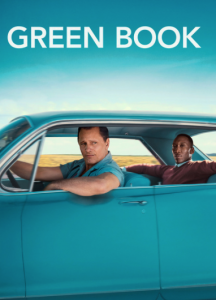Green Book Reflects More Than One Kind of Prejudice
As part of Cinemark’s 2019 Oscar Movie Week, we saw Green Book, starring Viggo Mortensen, Mahershala Ali, and Linda Cardellini. To say it is the best movie I’ve seen in a long time seems trite, but it’s true. Some folks say that the relationship between the real-life African-American musician, Donald (Doc) Shirley, and his Italian-American driver, Tony (Lip) Vallelonga, was strictly business, but there’s a lesson to be learned from the growing friendship and respect portrayed on the screen.
Set in 1960, both the musician and the driver experienced prejudice on the southern performance tour, and while the African-American experience has been much more severe than that of the Italian-American experience in our country’s history, the fact that we are more aware of one than the other has resulted in a leveling out, and today, both lie closely under the surface. This, of course, varies by geographic regions and culture.
In my own experience, for quite a few years, I’ve observed the Italian-American prejudice that exists and persists just under the surface in business and social environments. I noticed it overtly when I was a young adult in the 1980s, and I notice it subtly today.
Whether it is in group conversations, in committees, or work situations, there is often an accepted nuance when the nationality of Italian-American is acknowledged. It’s a slight facial expression, raising of the eyebrows, or a tone of the voice. It infers that Italian Americans are connected to the mob, are of lower intelligence, or slightly lacking in integrity.
When I was very young in the 1960s, I had little appreciation of race, nationalities, etc. I went to an all-white Pennsylvania Catholic grade school, but I do remember thinking something wasn’t quite right when a nun asked the class why we didn’t have any “Negroes” in our school. We students didn’t have an answer, so she supplied it. She said it was because they wouldn’t feel “comfortable.”
In the 1970s, it was still acceptable to call Italian-Americans Dagos or Wops. Polish-Americans were called Polacks, and jokes about both ran amok. Thankfully, none of those terms are acceptable today, but I actually heard an old-timer use the word, Dago, just recently. He quickly corrected himself, with a sheepish grin. In school, I remember an Italian-American boy tormenting a German-American boy at the lunch table, calling him a Kraut. It seems odd now, that the picked-on kid didn’t fire back with a Dago or Wop retort.
For me, the most overt evidence of prejudice against Italian-Americans came the 1980s, when my husband, who is Italian-American, recommended a friend of his for a branch-manager position. It seemed that this friend, also Italian-American, just could not get hired at the bank, no matter how many times he applied. Finally, my husband’s boss told him that the friend just looked “too ethnic,” and he could never hope to be hired. I guess my husband was lucky that he didn’t look too ethnic and his name last name is a derivation of an Italian surname that makes people confused about its origins.
I appreciated the scene in Green Book in which a man in a southern bar says that Italians are really half-Black. That southern man vocalized the thinking of many southerners, but to be fair, the African-American character had to deal with the overt prejudice of being confined to certain hotels and restaurants. The Italian-American could lodge and dine wherever he wished, however, even he wouldn’t be accepted in many southern social circles.
My own ancestry is English and German, and when I started my writing career, I went back to my maiden name, thinking it was easier to pronounce than my married name. Of course, I’m called Silverstone, Silverton, etc., so that was a fail. I’d like to change it back, but my husband says to wait until he changes his back to the original form.
Anyhow, the name Silverthorn is WASP-ish (the Catholic part came from my German-immigrant grandmother). Because of my name, my hair color, and eye color, I have been present in groups where the insidious gestures and offhanded comments have been made about Italian-Americans, the participants thinking none were in hearing distance. When appropriate, I make it clear that my husband is 100% Italian and my kids are 50%.
To sum all of this up. I just wanted to say that Green Book has given me a vehicle to discuss this topic, which has concerned me for some time. While we are so careful to be politically correct about overt racial, ethic, or cultural differences, there are still some that will be harder to change because the problem is not often acknowledged or realized. When reviewing resumes, there are still many hiring managers that will favor the easier-to-pronounce surnames over the ones with too many consonants, too many vowels, or the suggestion of a Middle-Eastern origin. Thankfully, civil-rights laws are designed to protect individuals from hiring and housing bias based on race, religion, age, etc., but some not be aware that these laws also include protections based on national origin.
This all reminds me of what Peace Pilgrim said about the subject, “I am not concerned with racial or ethnic background or the color of one’s skin; all people look to me like shining lights. . . . We the people of the world need to find ways to get to know one another—for then we will recognize that our likenesses are so much greater than our differences, however great our differences may seem.”




Leave a Reply